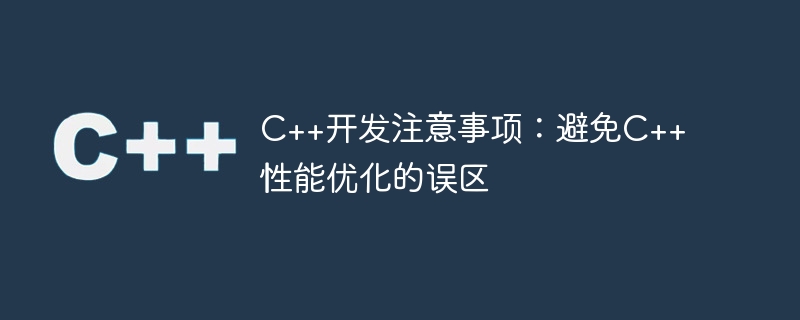Home >Backend Development >C++ >C++ Development Notes: Avoid Misunderstandings in C++ Performance Optimization
C++ Development Notes: Avoid Misunderstandings in C++ Performance Optimization
- WBOYWBOYWBOYWBOYWBOYWBOYWBOYWBOYWBOYWBOYWBOYWBOYWBOriginal
- 2023-11-22 12:01:501113browse

C development considerations: Avoid misunderstandings in C performance optimization
In C development, performance optimization is a very important factor. Optimizing the performance of the code can improve the execution efficiency and response speed of the program, which is especially important for large projects and applications requiring high performance. However, when optimizing C performance, we also need to pay attention to some misunderstandings to avoid introducing more problems.
Myth 1: Premature optimization
Premature optimization is a common mistake, that is, focusing too much on performance in the early stages of writing code while ignoring the readability and maintainability of the code. In the early stages of software development, more emphasis should be placed on writing code that is concise, correct, scalable, and readable. Optimization should only be considered when performance bottlenecks are truly identified and have a significant impact on performance improvement.
Myth 2: Not using appropriate algorithms and data structures
Choosing appropriate algorithms and data structures is crucial to performance optimization. When solving a problem, you should try to choose the algorithms and data structures that are most suitable for the current situation. For example, using a hash table instead of a linear search can greatly improve the efficiency of the search. In order to correctly select algorithms and data structures, developers should be familiar with common algorithms and data structures and understand their differences and applicable conditions.
Misunderstanding 3: Not using appropriate compilation options
The optimization options of the compiler can perform some optimizations on the code to improve the performance of the program. However, many developers are unfamiliar with compiler options or only use the default options, resulting in failure to take full advantage of the compiler's optimization capabilities. Understanding the compiler options and using them appropriately can improve the performance of your program.
Myth 4: Abuse of inline functions
Inline functions can reduce the cost of function calls and improve program execution efficiency. However, misuse of inline functions can cause some problems. Too many inline functions may increase compilation time and code size, making it difficult for the compiler to optimize. Therefore, inlining should only be considered for small functions that are called frequently.
Misunderstanding 5: Not performing performance testing and analysis
For code that is optimized for performance, sufficient performance testing and analysis must be performed. Relying solely on the subjective judgment of developers cannot determine the exact performance improvement effect. Through performance testing and analysis, you can determine whether optimization actually improves the performance of your program and identify possible problems and bottlenecks. Only after sufficient performance testing and analysis can the effect of optimization be determined and further optimization adjustments made.
Myth 6: Ignoring portability
When optimizing performance, developers may use some platform-specific optimization techniques and instruction sets. Although these techniques can bring performance improvements, they can also lead to reduced code portability. Portability is an important factor in software development, especially for cross-platform applications. When optimizing performance, you should weigh the relationship between performance and portability and choose an appropriate approach.
To sum up, C performance optimization is a complex and important task, and developers need to pay attention to avoid some common misunderstandings when writing code. By fully understanding and mastering appropriate algorithms and data structures, using compilation options correctly, using inline functions appropriately, conducting performance testing and analysis, and paying attention to code portability, we can help us optimize C performance more effectively and improve programs. execution efficiency and response speed. Only by optimizing performance at the right time and in the right way can you achieve the best results.
The above is the detailed content of C++ Development Notes: Avoid Misunderstandings in C++ Performance Optimization. For more information, please follow other related articles on the PHP Chinese website!
Related articles
See more- Analysis of misunderstandings about the use of blocking (join) and lock (Lock) in Python multi-threading
- Things to note when deploying thinkphp5.1 on Baidu Cloud Host
- What are the precautions for making ppt?
- What should we pay attention to when implementing distributed locks in Redis? [Summary of precautions]
- Steps and precautions for deleting ssh key in git

